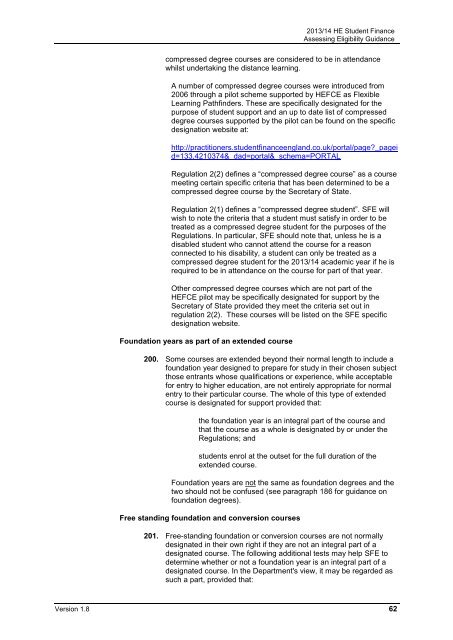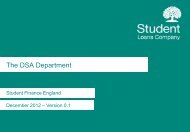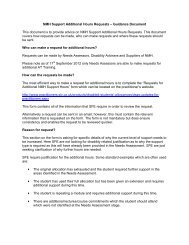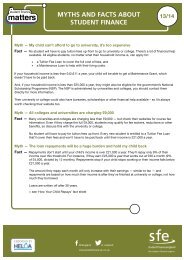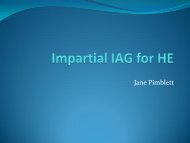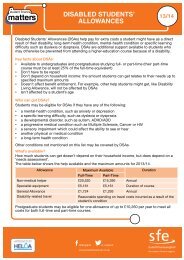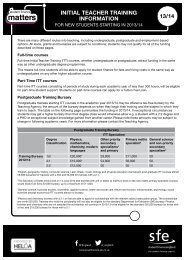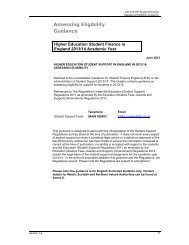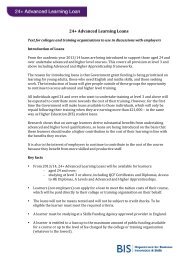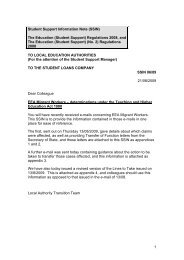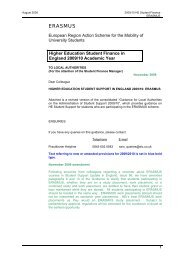SFE Assessing Eligibility Guidance 2013/14 - Practitioners - Student ...
SFE Assessing Eligibility Guidance 2013/14 - Practitioners - Student ...
SFE Assessing Eligibility Guidance 2013/14 - Practitioners - Student ...
Create successful ePaper yourself
Turn your PDF publications into a flip-book with our unique Google optimized e-Paper software.
<strong>2013</strong>/<strong>14</strong> HE <strong>Student</strong> Finance<br />
<strong>Assessing</strong> <strong>Eligibility</strong> <strong>Guidance</strong><br />
compressed degree courses are considered to be in attendance<br />
whilst undertaking the distance learning.<br />
A number of compressed degree courses were introduced from<br />
2006 through a pilot scheme supported by HEFCE as Flexible<br />
Learning Pathfinders. These are specifically designated for the<br />
purpose of student support and an up to date list of compressed<br />
degree courses supported by the pilot can be found on the specific<br />
designation website at:<br />
http://practitioners.studentfinanceengland.co.uk/portal/page_pagei<br />
d=133,4210374&_dad=portal&_schema=PORTAL<br />
Regulation 2(2) defines a “compressed degree course” as a course<br />
meeting certain specific criteria that has been determined to be a<br />
compressed degree course by the Secretary of State.<br />
Regulation 2(1) defines a “compressed degree student”. <strong>SFE</strong> will<br />
wish to note the criteria that a student must satisfy in order to be<br />
treated as a compressed degree student for the purposes of the<br />
Regulations. In particular, <strong>SFE</strong> should note that, unless he is a<br />
disabled student who cannot attend the course for a reason<br />
connected to his disability, a student can only be treated as a<br />
compressed degree student for the <strong>2013</strong>/<strong>14</strong> academic year if he is<br />
required to be in attendance on the course for part of that year.<br />
Other compressed degree courses which are not part of the<br />
HEFCE pilot may be specifically designated for support by the<br />
Secretary of State provided they meet the criteria set out in<br />
regulation 2(2). These courses will be listed on the <strong>SFE</strong> specific<br />
designation website.<br />
Foundation years as part of an extended course<br />
200. Some courses are extended beyond their normal length to include a<br />
foundation year designed to prepare for study in their chosen subject<br />
those entrants whose qualifications or experience, while acceptable<br />
for entry to higher education, are not entirely appropriate for normal<br />
entry to their particular course. The whole of this type of extended<br />
course is designated for support provided that:<br />
the foundation year is an integral part of the course and<br />
that the course as a whole is designated by or under the<br />
Regulations; and<br />
students enrol at the outset for the full duration of the<br />
extended course.<br />
Foundation years are not the same as foundation degrees and the<br />
two should not be confused (see paragraph 186 for guidance on<br />
foundation degrees).<br />
Free standing foundation and conversion courses<br />
201. Free-standing foundation or conversion courses are not normally<br />
designated in their own right if they are not an integral part of a<br />
designated course. The following additional tests may help <strong>SFE</strong> to<br />
determine whether or not a foundation year is an integral part of a<br />
designated course. In the Department's view, it may be regarded as<br />
such a part, provided that:<br />
Version 1.8 62


